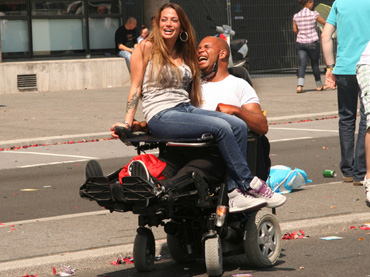The Netherlands is popular not only for supporting everything from housing and education, but also for subsidizing sex for the disabled. Because prostitution is legal in the country, the government is doing its best to boost the intimate endeavors of the disabled citizens, as well as the domestic sex economy. To make everything simple, sex is treated as a right that everyone in the country should enjoy.
Although there isn’t really a direct sex grant, the people with disabilities can spend their benefits in whatever purpose they like. According to some reports, they can use these to access sex services at least 12 times a year. However, information about the particulars is deceitful.
Chris Fulton, a 29-year-old native with cerebral palsy and muscular dystrophy, has launched a campaign, asking the Dutch government to introduce a way better grant scheme.

[dfp1]

[dfp2]
But, among all services, why would the government support sex? Well, aside from the pleasure, sex is considered a form of physical and mental therapy. In fact, in psychology, some experts say it has the ability to fulfill the needs for self-esteem, validation, and intimacy. In other areas of medicine, it is referred to as an antidote to pain and stress. There are even individuals who can give personal testimonies regarding this matter.
These days, there are social workers and caretakers that are calling for a better access to sex services for people with disabilities. But, granting this is never easy. The right to sexuality sparks a variety of issues, which include majority of the citizens not wanting their taxes to be used to support such a naughty business. Nevertheless, there are still advocates, who respond that it is not about supporting the sex business. It is giving solutions to health issues and promoting other people’s rights.
Aside from tax issues, there are critics who are very concerned about the safety of disabled citizens. While disabled women may potentially suffer abuse from male sex workers, not all of their population will trust them anymore.
Another equally controversial issue is consent. Regardless of whether they are of legal age or not, can mentally disabled people survive such arrangements? There was one case in which a woman, who tried to help her son with down syndrome lose his virginity, was accused of pimping him.

Over the years, various sexual rights movements has taken off. Tuppy Owens, a sex therapist, told the Guardian, “Finding a sex worker who will talk, teach, accept … is a bit of a boost of confidence and self-esteem”.
Perhaps, the most disturbing question in supporting sexual services is whether advocates are just hurting the disabled population. Mik Scarlet, an advocated in the sexuality and disability movement, explained, “If you’re growing up as a disabled child or someone who’s just come to disability, how does that affect how you feel about yourself? I don’t want a world where it’s easier for disabled people to visit sex workers, I want a world that sees disabled people as sexual and valid prospective partners”.

[dfp3]
Whatever may be the decision in the Netherlands, so far, it won’t probably be accepted as a solution in the United States. But obviously, the issue is worth discussing. Not only will this invite better solutions, but it will also bring significant changes in how the world sees people with disabilities. Even though sex isn’t really considered a human right, it is becoming a major element in the battle against the insensitive treatment people with disabilities from all corners of the world, are facing.


